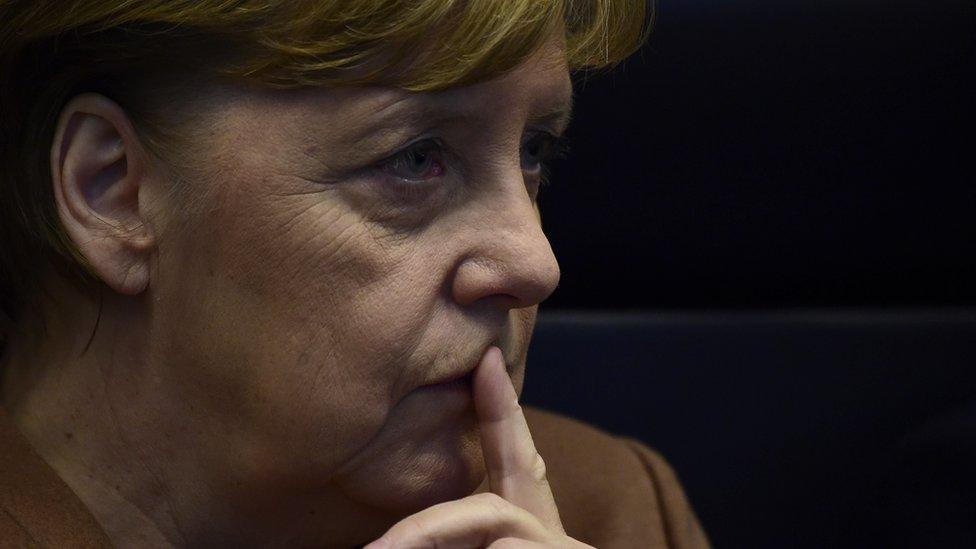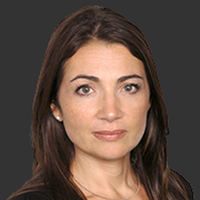Germany and Merkel find feet as EU's reluctant leaders
- Published
- comments
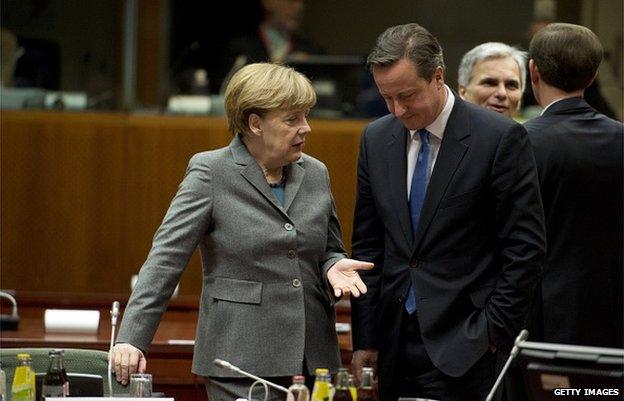
"You can choose if you want to take your boots off or not," the burly official at Berlin airport security told me.
"But won't they beep as I walk through the metal detector?" I asked
The official raised his eyebrows, shrugged and said somewhat disingenuously, "It's up to you. You decide."
I looked at the machine, thought what a bore it would be to have to go through twice and, of course, took the boots off.
The official was silently smug.
A perfect example of German consensus politics.
Unlike the UK, where the political scene is combative, and confrontational - viewed at home as a sign of a healthy democracy - the political system in Germany after the war was designed to make it virtually impossible for the star of any single party to shine too brightly and to necessitate working together across party lines. Political processes are slow.
The British may think that boring.
Most Germans find it comforting bearing in mind their country's uncomfortable past.
Foot-dragging
When Angela Merkel first became chancellor of Europe's largest economy she liked to speak of the politics of Small Steps.
In Berlin this week I found myself thinking how, in the 10 years since, those have turned into Large Strides.
With a lot of foot dragging along the way.
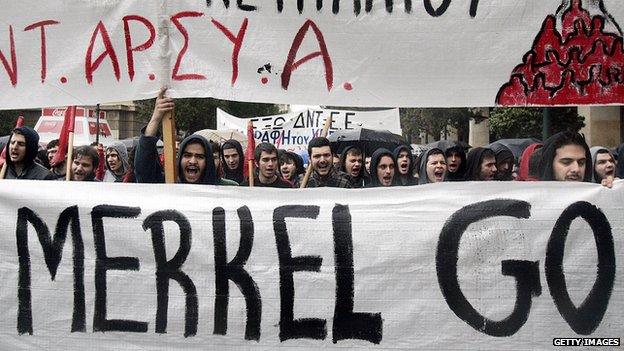
In Greece, some of the rage felt by anti-austerity activists has been directed to Angela Merkel personally
When it comes to the summit of the EU's 28 leaders in Brussels this week, Angela Merkel is the undisputed queen.
But she wasn't too keen to wear the crown.
When the economic crisis hit the eurozone seven years ago, Germany did not spring into action.
Mrs Merkel was unceremoniously shoved - by the financial markets, by European institutions, by fellow eurozone members and Germany's close friend, the US, to take the initiative.
To lead.
Much has been made of the fact that the word for leader in German is Fuehrer.
A word which became synonymous with Hitler.
Post-war Germany has felt most comfortable as part of wider alliances - the EU, the eurozone, the UN, and Nato.
But I now find the country growing accustomed to its new role as leader of, rather than just one of, the pack.
After news broke this week that Chancellor Merkel had asked the Greek prime minister to Berlin next Monday, German media revelled in speculating whether Alexis Tsipras had been invited or summoned.
And while Russia is clearly a number one concern for all the EU and for the United States, it is the German chancellor taking the lead on the diplomatic stage.
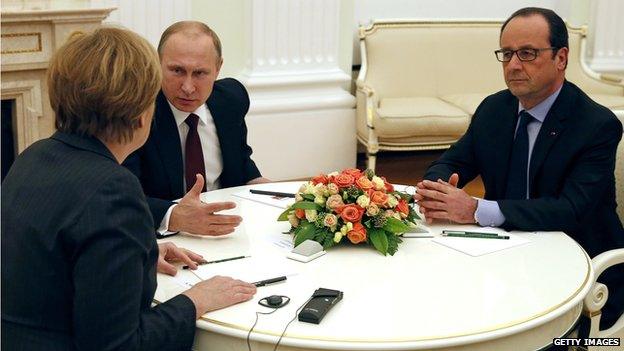
Angela Merkel is fluent in Russian, which reportedly affects the style of negotiations with Vladimir Putin
France, of course, has appeared alongside Germany in hammering out the Minsk agreements with Russia but I have it on good authority that, whereas the hours-long diplomatic phone calls between Vladimir Putin, Angela Merkel and Francois Hollande tend to begin with each person speaking in their mother tongue, after a while Mr Putin and Mrs Merkel slip in to Russian, leaving their French colleague rather to one side.
Mummy's in charge
Angela Merkel is a dedicated European.
One does sometimes wonder, though, when she is acting in the interests of the EU and when the hat she wears is made in Germany.
In the debate about sanctions against Russia, for example, Mrs Merkel is far less hawkish than Poland, the UK or the Baltic states.
Is that because she wants to leave room to encourage Vladimir Putin or is it because tougher sanctions would be too painful for the many German businesses with close ties to Russia?
Her austerity policy as a one-solution-fits-all answer to the eurozone crisis has also met with increasing criticism.
But the EU accepts it is now led by a German and that is pretty remarkable. The European Union was conceived as a means of containing Germany after World War Two.
It is also quite something that Germans, who have spent decades growing up in the shadows and with the guilt of two world wars, are now more at ease with their country's modern-day leadership role.
A lot of that has to do with the figure of Angela Merkel.
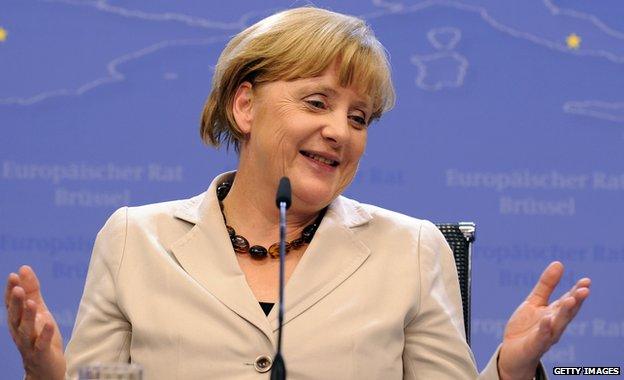
Some Germans call her Iron Angie but she is also known at home as "Mutti" (Mummy).
A strong leader, but at the same time unthreatening: partly because of her clothes, her manner of speaking, her rather awkward demeanour in public.
But this is Mrs Merkel's third term in office.
She may not run again in 2017.
Finding another German leader, who can walk the precarious diplomatic tightrope as skilfully as Mutti won't be easy.
- Published13 February 2015
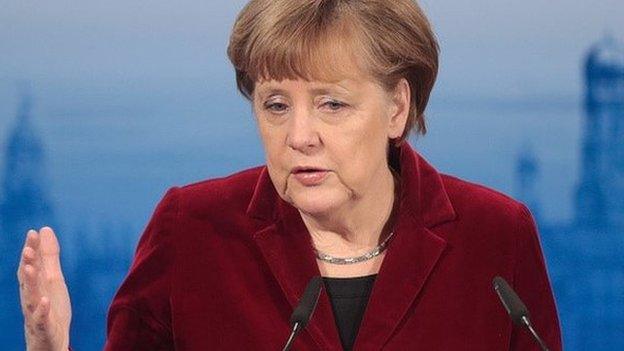
- Published12 February 2015
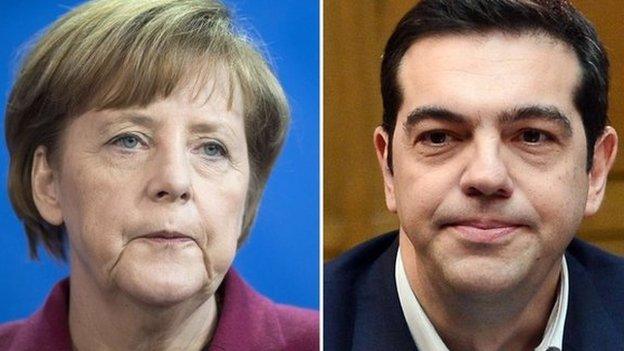
- Published3 June 2019
